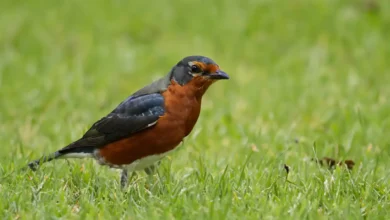Why birds don’t fly at night

Introduction
The natural world is filled with awe-inspiring sights and behaviors, and the diverse behaviors of birds are no exception. During the day, the skies are often alive with avian activity – from vibrant plumage fluttering between trees to birds soaring high above. However, as the sun dips below the horizon, an intriguing silence descends upon the skies. This silence raises a curious question: Why birds don’t fly at night? This article seeks to delve into the intricate reasons behind birds’ nocturnal inactivity, shedding light on the fascinating world of avian behavior after dusk.
Evolutionary Adaptations
Body Clocks and Circadian Rhythms
Central to understanding birds’ reluctance to fly at night are their internal biological clocks. Birds, like many creatures, possess an innate circadian rhythm, a biological mechanism that regulates their sleep-wake cycles, hormone release, and other physiological processes. These internal clocks are finely attuned to the daily cycle of light and darkness, guiding birds’ activities such as foraging, mating, and resting. This synchronization with the day-night cycle significantly influences their behavioral patterns.
Vision and Nighttime Limitations
Birds’ vision differs significantly from that of humans. While birds exhibit exceptional visual acuity during the day, their vision is relatively compromised in low-light conditions. This limitation poses challenges for birds when navigating and foraging at night. The reduced visibility during darkness hinders their ability to detect obstacles, find food, and avoid potential dangers, contributing to their preference for diurnal activities.
Predation and Safety Concerns
Vulnerability to Predators
The cover of darkness increases the vulnerability of birds to nocturnal predators. Evolution has favored a cautious strategy among many bird species, minimizing their activities during the night to reduce exposure to potential threats. By refraining from night flights and remaining grounded, birds reduce the risk of encountering predators that are adept at hunting under the cloak of darkness.
Navigation Challenges
Birds rely heavily on visual cues for navigation. The absence of sunlight and the limited availability of visual landmarks make it challenging for birds to orient themselves in the dark. The reliance on visual cues means that navigating in low-light conditions is considerably more difficult, further discouraging birds from taking flight at night.
Energy Conservation and Rest
Energy Conservation
Flight is an energetically demanding activity for birds. It requires significant amounts of energy to sustain the vigorous flapping of wings and aerial maneuvers. Resting at night allows birds to conserve their energy reserves, ensuring they have ample resources for essential daytime activities such as foraging, territorial defense, and reproduction.
Restorative Sleep
Undisturbed sleep during the night is crucial for birds’ health and overall well-being. Similar to humans, birds require restorative sleep to maintain optimal cognitive function, immune responses, and physical health. Nighttime rest contributes significantly to their ability to thrive in their ecosystem.
Environmental Factors
Temperature and Weather Conditions
Nighttime brings a drop in temperature and reduced visibility, which can significantly impact a bird’s ability to fly. Cold temperatures increase the energetic costs of flight, compelling birds to seek shelter and conserve energy. Reduced visibility during the night also poses challenges, further discouraging birds from taking to the skies.
Availability of Food
Most bird species are diurnal foragers, actively seeking food during daylight hours when food sources are visible and accessible. The limited opportunities to find food at night, compounded by the challenges of navigating and detecting prey in darkness, prompt birds to focus their foraging activities during the day.
Exceptions in Nocturnal Behavior
Nocturnal Bird Species
While most birds prefer the safety and visibility of daytime activities, certain bird species have evolved exceptional adaptations that enable them to thrive in nocturnal environments. These unique species exhibit characteristics and behaviors that allow them to navigate, hunt, and thrive in low-light conditions, effectively utilizing the darkness to their advantage.
Conclusion
In summary, a myriad of factors, including evolutionary adaptations, safety concerns, energy conservation needs, and environmental influences, contribute to the phenomenon of birds avoiding night flights. While exceptions exist among certain nocturnal bird species, the general preference for diurnal activities is a result of a complex interplay of biological, ecological, and behavioral factors. Understanding these intricacies provides invaluable insights into the captivating world of birds and their strategies for survival in diverse habitats. Through this exploration, we gain a deeper appreciation for the adaptive nature of avian behavior and the importance of respecting their natural rhythms and habitats.
FAQs
1. Why don’t most birds fly at night?
- Most birds are diurnal, meaning they are active during the day and rest at night. Flying at night presents challenges such as reduced visibility, increased vulnerability to predators, and difficulties in navigation, prompting many birds to avoid nocturnal flights.
2. Which birds fly at night?
- While most birds are inactive during the night, some species are adapted for nocturnal activities. Nocturnal birds like owls, nightjars, and certain species of nighthawks have specialized adaptations allowing them to fly and hunt efficiently in low-light conditions.
3. How do birds see in the dark?
- Birds have adaptations for low-light vision, including a higher density of rod cells in their retinas. Additionally, some nocturnal bird species possess larger eyes and pupils that can dilate more extensively to capture available light, aiding in night vision.
4. Why are birds more vulnerable to predators at night?
- Darkness provides cover for nocturnal predators, making it harder for birds to detect and evade threats. As a result, many birds minimize their activities at night to reduce the risk of encountering predators.
5. Do birds sleep at night?
- Yes, most birds do sleep at night. They seek shelter in roosts or protected areas to rest, as sleep is essential for their health and well-being.
6. Can birds adapt to night flights?
- Some bird species have evolved exceptional adaptations, such as enhanced night vision or specialized flight capabilities, enabling them to thrive during nocturnal activities. These adaptations allow for successful navigation, hunting, and survival in low-light conditions.





